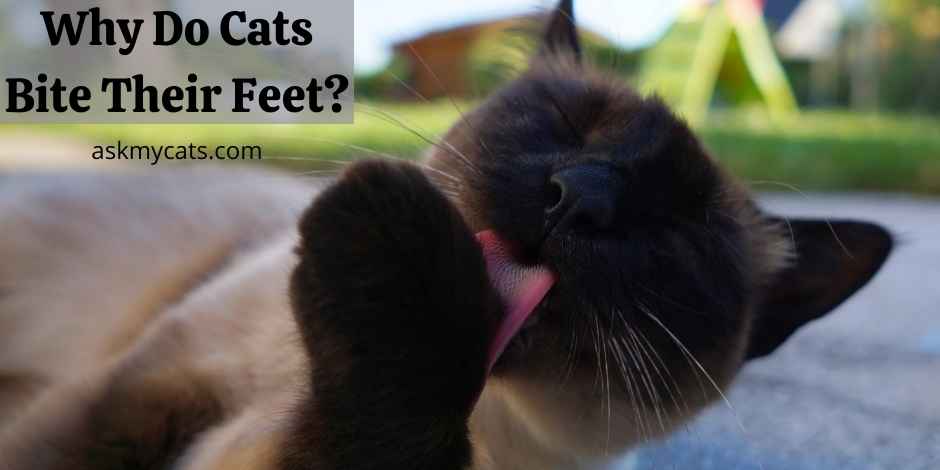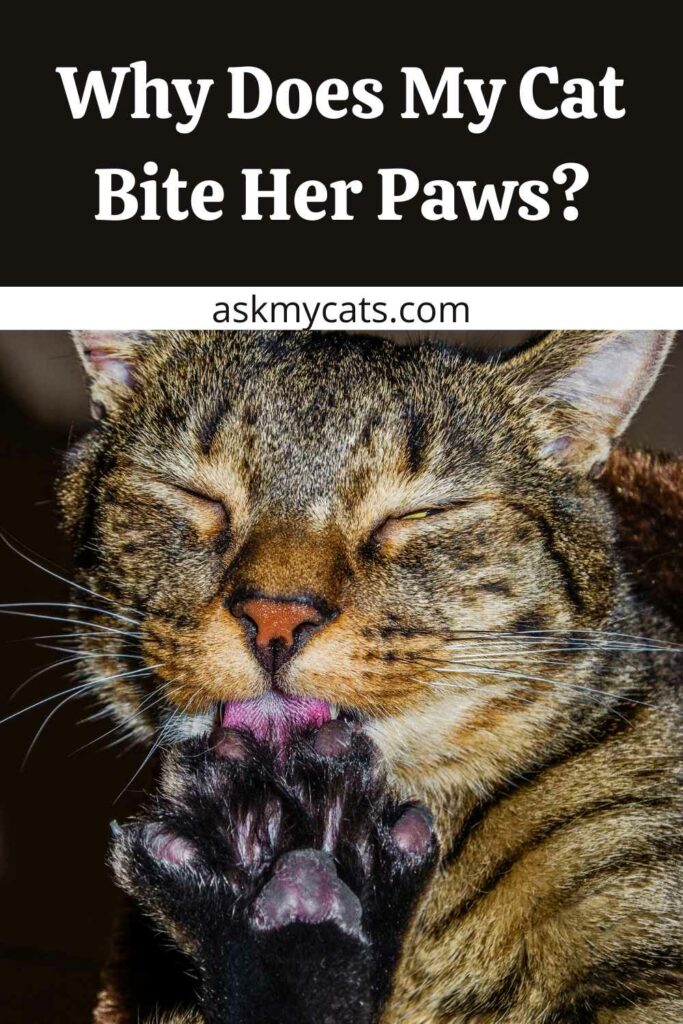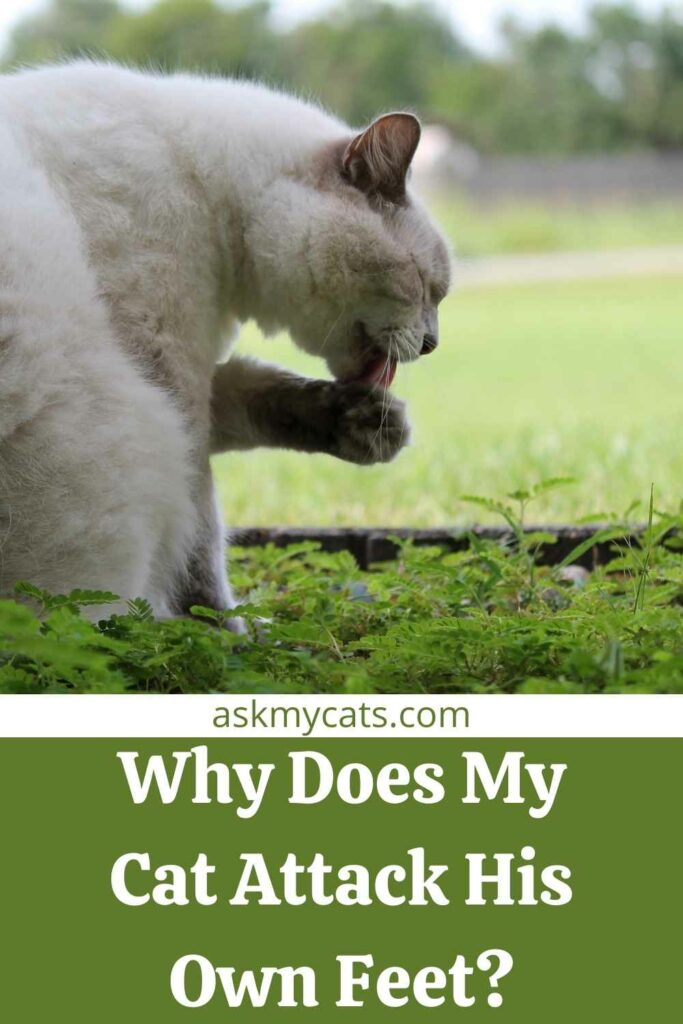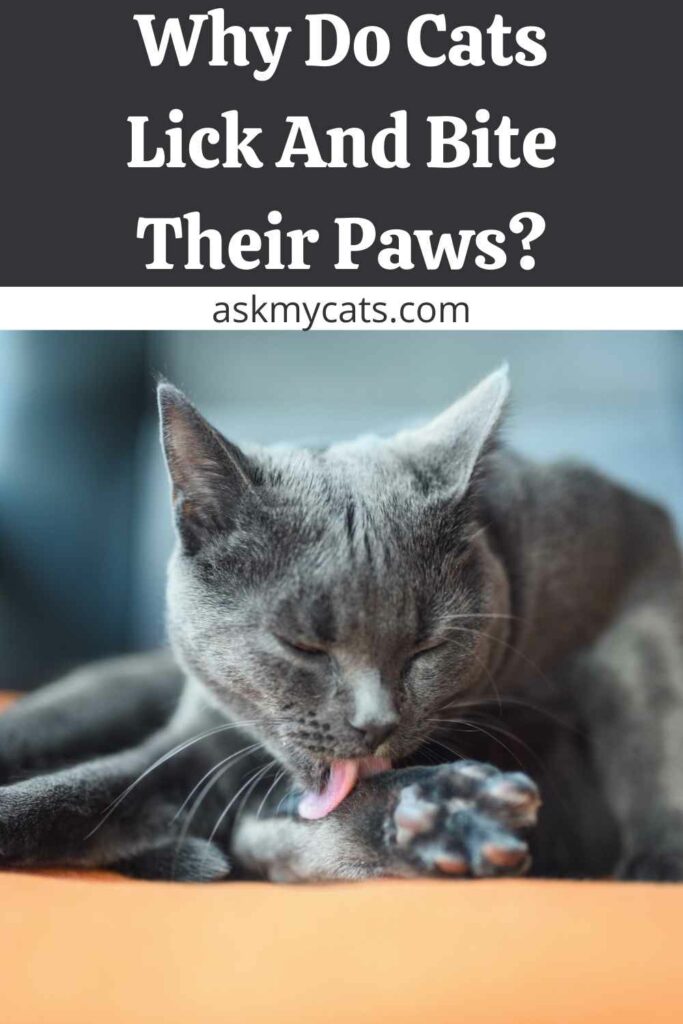Cats have a rigorous grooming schedule. It is not uncommon for them to lick every square inch of their bodies that they can reach in order to remove dirt and dead hairs. It is, nevertheless, critical to be aware of any changes in their grooming regimen that may occur.
Over grooming is an issue, even if they groom a lot. If they begin biting on a regular and persistent basis, the situation will become more serious.
Cats may also bite their legs in order to get their guardian’s attention. Cats are a lot more sociable than most people realize. They may self-mutilate as a method of gaining attention if they do not receive enough from their human relatives.
In this article, we are going to discuss the various factors due to which cats are compelled to bite their own legs!


Give Your Cat the Perfect Day
Get the Free Ebook!
Why Does My Cat Bite Her Paws?
Your cat is biting her paws to groom and clean the fur present in that area.

Cats are meticulous housecleaners. They are not biting; instead, they are cleaning between their claws and other areas. Keep in mind that certain areas of a cat’s anatomy are used to help him feed, fight, and kill prey, therefore they must be maintained clean.
Don’t worry; they’re aware of the situation. When they grip their paws with their teeth, it appears to be painful, but it’s all for hygiene.
My cats frequently appear to be biting their paws, but they are actually cleaning them by removing the strands of hair with their teeth. They sometimes pull so hard on them that it creates a loud noise. They’ll switch to another paw once they’ve done it with one for a time.
This is typical, but you should inspect the cat’s paw just in case there is an issue. It’s possible that a claw has been injured. If the cat performs it with only one paw, there is most certainly a problem.
In general, the reasons for a cat biting its legs are identical to those for biting its tail. They won’t chase their legs around as a cat does, but tension and idleness might lead to excessive grooming.
Parasites can make them want to bite and scratch their legs, but there are some that make them want to bite and scratch their legs in particular. Ticks, for example, lurk in grasses and other plants and may rub up against a person’s legs as they pass by.
If your cat bites or chews its legs or paws, we need to think about the details of these regions. We should investigate whether there is something on their paws that is causing the severe biting because they are closer to the ground.
Perhaps they stepped on something sharp, or a foreign object became trapped. Because cats’ paws are so delicate, it may not take much to hurt them.
Give them a thorough inspection at home, but take them to the vet if you can’t find anything wrong with them and they continue to brush excessively.
In cats, this is a rather unusual habit. If a cat’s guardian notices this, it’s reasonable that they get concerned. When a cat feels uncomfortable in the mouth, it will bite its tongue. Itching or discomforts are other possible side effects.
Almost all of these tooth and gum problems in cats are caused by inflammatory and progressive diseases like gingivitis or periodontitis.
Oral disorders in cats, unfortunately, are far more common than we would want. The buildup of tartar between the teeth and gums of cats causes the great majority of dental issues.
They may be avoided by following a good oral hygiene regimen that includes brushing and flossing on a regular basis.
You will also like to read about why is my cat biting her kittens
Why Does My Cat Attack His Own Feet?
Your cat is attacking his own feet because he is feeling some sort of discomfort in that area.

Even the most elegant cats can’t always control what their bodies do. When they kick themselves in the face, for example, a defense mechanism is activated.
In the wild, they would use this to either kill their prey once they had it or to fend off an opponent such as another cat or dog.
It is activated when cats are bent over and their legs begin to kick themselves. They will bite their leg to halt the kicking action by overriding their nervous system.
Cats become irritated for the same reasons as humans do. He wishes to do or own something but is unable to do so. Maybe he’s inside, staring out a window, and he’s itching to fight the cat that’s straying into his domain.
He could want to play, hunt, stalk, kill, and eat, but he doesn’t have anything to play with or eat. Boredom, annoyance, and stress are all handled differently by different animals.
Compulsive behaviors in cats, such as over-grooming and wool-sucking, are based on behaviors that are already part of the cat’s natural repertoire but have become abnormal because they’re repeated out of context, with no apparent goal, and sometimes in ways that are destructive, not only to the environment they live in (yours!) but to the cats themselves.
If you continue to expose the cat to the stressor, the behavior may be triggered not only by little quantities of the original stressor but also by completely unrelated stressors, until no stressor is required for the cat to engage in the obsessive activity.
Why Do Cats Lick And Bite Their Paws?
Cats lick and bite their paws because he is suffering from infections or allergies in that area. He also does that for grooming purposes.

Symptoms such as licking, gnawing, itching, and self-biting are frequent in dogs. Cats lick excessively, chewing away clumps of hair or excoriating the flesh around the head and face with their claws.
Cats scratch or chew excessively with their paws; target regions might include the entire body or particular areas such as the behind, legs, and feet. When symptoms arise in excess, regardless of their shape, they all point to one thing: itching.
The most prevalent cause of persistent or seasonal itching in dogs is allergic skin illness.
Skin symptoms such as rashes, scabs, pustules, ear infections, rear rubbing, and simple scratching can occur in both dogs and cats in reaction to an allergen that has been breathed, absorbed, touched, or injected (by an insect, for example), or ingested.
And, as we all know, itching leads to skin damage, inflammation, and infection.
Yeast and bacteria thrive in the warmth and moisture provided by inflammation and will thrive in this environment. These creatures and their detritus cause even more irritation and itching, as well as an allergic reaction in certain cases.
Itching is a common symptom of yeast infections. Almost the majority of yeast infections in pets, on the other hand, are caused by an allergic skin condition. Even yet, it’s worth noting that pets without allergies might have yeast infections from time to time.
Fleas Itching is very prevalent as a result of these insects. Flea bites are irritating enough on their own, but when a pet is sensitive to flea bites, even a small quantity of flea saliva can cause a writhing paroxysm of pruritus that lasts for weeks.
This fungal illness is known as dermatophytosis and is not a worm at all. It can also be quite itchy for certain cats.
Mange mites are really itchy creatures. Mange mites come in a variety of shapes and sizes. They can dwell on the skin’s surface or deep into pores and follicles.
Dogs and cats are infested by a variety of species, but the ultimate effect is typically the same: pruritus. Although lice can induce itching, their frequency of incidence and itch potential are lower on the list.
Animal skin, like yeast, may become irritated in the presence of bacteria. In cats, allergic skin disease is the leading cause of persistent bacterial skin infections.
Itching can be caused by a variety of systemic illnesses that appear on the skin. Hypothyroidism in cats, autoimmune illnesses, and psychogenic/behavioral problems are all examples.
How Can I Get My Cat To Stop Licking Her Paws?
You can clean your cat’s paws thoroughly so that they do not feel the need of grooming on their own and this will stop licking their paws.
Keep a closer check on them if you believe their conduct is out of control. Keep track of how often they lick their paws and how long they do it for. Any inflammation or hair loss on their skin or fur should be noted. Check for any symptoms of discomfort in the paw as well.
If you observe any of these changes, make an appointment with your pet’s veterinarian. This information will assist your veterinarian in determining whether your cat is licking their paws excessively or abrasively.
Your veterinarian will examine your cat throughout the visit. They’ll probably perform a few tests to figure out what’s causing their behavior and how to address it.
Skin cream, oral or injectable anti-inflammatory treatment, adjustments to your cat’s diet, flea and tick prevention medicine, pheromone therapy, or environmental alterations may be used depending on your veterinarian’s diagnosis.
Enrichments, or changes to the environment, allow your cat to enjoy additional exercise and excitement within the house. This may be as easy as using a food puzzle to feed them, building cat trees or shelves to allow them to use their climbing tendencies, and having them seek their toys.
Licking your cat’s paws isn’t usually a reason for concern. However, if they show indications of severe paw licking, contact your veterinarian right once. You and your veterinarian may decide on the best treatment for your pet together.
Frequently Asked Questions
Why do cats bite their back legs?
If you see your cat licking or biting the same location repeatedly, it’s possible that they’re in agony or discomfort in that area. Boredom, anxiety, or obsessive-compulsive disorder is all possibilities. Cats that are bored, agitated, or nervous are more likely to engage in compulsive gnawing, clawing, or licking activities.
Is it normal for cats to bite their legs?
Stress is the most common cause of compulsive behavior in cats, especially when they are torn between two conflicting courses of action. Or, as part of “Rolling Skin Syndrome,” or feline hyperesthesia, cats may attack their own tails or paw at their own faces.
Why is my cat excessively grooming?
Overgrooming can be behavioral, such as when a cat starts licking excessively as a stress reliever (also known as psychogenic alopecia), or medical, such as when the cat has skin allergies or parasites.
Final Words
If your cat has fleas, mites, or allergies that produce itchy skin, your petting might scratch an itch or make her feel uncomfortable. Although she may instinctively begin licking, some cats will bite or scratch the person performing the caressing, so be cautious.
Please leave your questions about your pet friend’s feeding habits in the comments section below. We’ll get back to you as soon as possible.
